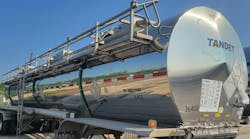With the economy tight and diesel prices soaring, tank truck carriers face constant pressure to maximize productivity in every possible way. The most recent Bulk Transporter Gross Revenue Report (in the May issue) showed that many tank truck fleets are making productivity gains, but more work is needed.
Petroleum fleets lead all tank truck sectors in productivity, with chemical haulers in second place. That conclusion is based on data showing average revenues of $270,491 per tractor for petroleum fleets. Chemical fleets reported average revenues of $203,795 per tractor. Food fleets and dry bulk haulers were well under $200,000 per tractor.
Just a few petroleum haulers have achieved per tractor revenues in the $300,000, and that level may be well beyond the realm of probability for most fleets in other sectors of the tank truck industry. However, tank fleets across the board should be targeting $200,000 as a base level for tractor revenue.
Fleet managers need to maximize productivity at every level of their operations. Every aspect of the fleet operation needs to be examined to uncover wasteful processes and systems that limit or degrade productivity.
Paper may be one of the biggest productivity killers in the tank truck industry today. Most fleets remain buried under an avalanche of paper records and documents that are still required by customers and government agencies. Progress away from paper has been painfully slow, but this is where fleets can make some big gains.
Bulk Transporter recently participated in an Elemica logistics conference that focused on paperless, touchless communications that seamlessly connect chemical shippers and the supply chain (including tank truck carriers and storage terminals). Significant opportunities exist to streamline and automate the logistics process. The industry has just begun to explore these opportunities.
In fact, the chemical sector in general lags well behind other industry groups in supply chain management. Not a single chemical shipper is ranked in the top 25 for supply chain management, according to Garrett Gee with Bearing Point. Truck fleets don't fare any better for the most part.
George Grossardt with Schneider National Bulk Carriers was another speaker at the conference, and he focused on the benefits of a paperless, touchless system. He pointed out that his company has achieved an approximately 18% productivity gain with the Elemica system. Order entry is much more efficient, and Schneider National workers can focus on other ways to improve customer service.
Reams of paper also can be removed from the driver hiring and management process. Ron Thomas with Eagle Transport Corp said during a recent press conference that his company cut driver hiring paperwork by 75% when it switched to an electronic application system. The press conference was sponsored by Tenstreet LLC, a developer of software for driver recruiting and retention.
In addition to eliminating paper, the online system used by Eagle Transport moves applicants through the hiring process faster and more efficiently. Managers can make better, quicker, and more accurate decisions. Little time is wasted identifying the best driver candidates and getting them into a truck.
Such management systems are credited with helping US industry in general boost worker productivity by 2.2% in the first quarter of 2008. That was better than the 1.5% projected increase and impressive considering the sluggish economy.
In coming years, higher productivity may be the only way to offset challenges such as the driver shortage and increasing traffic congestion and gridlock. Diesel prices aren't likely to moderate anytime soon.
Fleets must run the most efficient vehicles they can afford, and keep those vehicles just as busy as possible. Management needs the best tools to safely maximize loaded miles and minimize delays.
To stay competitive and to survive, tank truck carriers must use every tool at their disposal to boost productivity. That is absolutely critical in the operating environment that exists today and will exist in the future.








